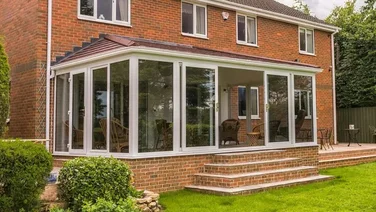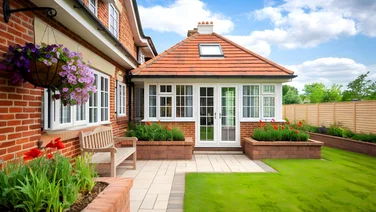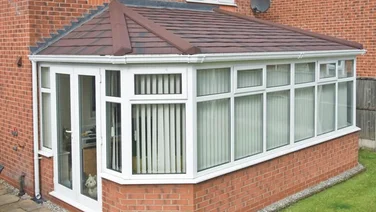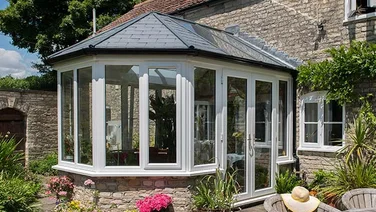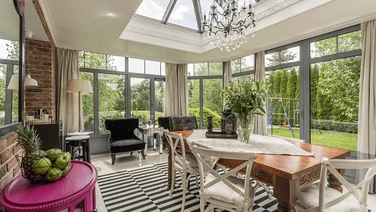- When should I repair my conservatory?
- Can a damaged conservatory increase my energy bills?
- How much will it cost to repair my conservatory?
- How can I look after my conservatory so it doesn’t need repairing?
- Is it better to repair or replace my conservatory?
- What are the benefits of owning a conservatory?
- Summary
- Damaged conservatories are not only an eyesore but they can cost you if you don’t get them repaired.
- Deciding whether you need to repair or replace your conservatory depends on how badly damaged it is.
- Repairs are typically cheaper upfront, but a replacement will tend to offer better long-term value.

Conservatories are a great way to make your home more comfortable and increase its value. They provide a handy space for relaxation, entertaining guests or simply enjoying views of your garden throughout the year.
Regular maintenance is essential to fully enjoy these rooms. Not only does this help keep them in good condition, but it helps you maximise their energy efficiency, reduce heating and cooling costs, and maximises comfort.
If you don’t, minor issues can quickly escalate into costly major repairs. For this reason, regular maintenance and prompt action when problems arise protect your investment, maintain energy efficiency and extend the conservatory’s lifespan.
Read on to learn more about the need and likely cost of conservatory repairs to keep yours in tip-top shape.
When should I repair my conservatory?
A conservatory not only adds much-needed extra living space to your home but can also enhance your home’s comfort and value –but only if it is well-maintained. To this end, it is a good idea to regularly check your conservatory for signs of wear and tear.
- Leaks – If rainwater is getting inside your conservatory, this is a sign that something is wrong with your roof or window seals. If left untreated, this could lead to mould, dampness and structural damage.
- Draughts – Much like water leaks, feeling cold air around windows or doors can be a sign that the draught-proofing of the window, glazed roof or door has deteriorated. If found, you’ll want to sort this out ASAP to help cut heating costs.
- Visible damage – Broken glass, cracks or warping) are not only an eyesore but can also reduce the safety and expected lifespan of the structure. Things such as cracks or warping could indicate a more serious issue concerning the conservatory’s foundations and should be investigated by a professional.
- Condensation inside windows – If any double glazed parts of your conservatory show signs of fogging or misting, this is a sign that the seal between glass panes has failed. This is not only unsightly but is also an indication that the unit’s insulation has been compromised and needs repair or replacement.
- Doors are hard to open – This often indicates poor alignment or structural problems. If left untreated, this can impact the security of your conservatory and ease of use.
- Too hot in the summer and too cold in the winter – Poor temperature regulation tends to indicate inadequate insulation or ageing materials, limiting your conservatory’s usability throughout the year.
There are some common faults that can be easily identified without the need for a builder:

Can a damaged conservatory increase my energy bills?
Yes, it can. Things such as bad draughts, ineffective double glazing or poorly fitted doors will mean that you’ll need to spend more on heating (or cooling) to keep the space comfortable throughout the year.
Issues such as draughts, broken seals or leaks reduce the conservatory’s insulation effectiveness, leading to heat loss in winter and heat gain in summer. Heating or cooling systems (called conditioning in the industry) are designed to heat or cool a body of air inside your home.
Any colder/warmer air leakage will mean your heating must work harder, thereby consuming more energy. What’s more, poor insulation and structural issues can also impact your home’s overall Energy Performance Certificate (EPC) rating.
A lower EPC rating can negatively influence your property’s market value and attractiveness to potential buyers. There can also be regulatory impacts and costs if your home has a poor energy rating (especially if you or a potential buyer are considering renting it to a third party).
How much will it cost to repair my conservatory?
Conservatory repairs can vary wildly, from minor fixes that are relatively quick and inexpensive to major repairs that can be costly and require extensive work.
That being said, here is an overview of minor and major repairs, along with approximate costs:
Minor repairs:
- Sealing leaks or replacing cracked panes (£100-£400)
- Replacing a missing roof tile (£75-£130)
- Cleaning gutters (£35-£85)
- Broken glass roof section repair (£300-£350)
Major repairs:
- Solid roof replacement (£5,000-£7,000)
- Glass roof replacement (£3,000-£5,000)
- Roof, window and door replacement (£4,000-£8,000)
- New conservatory build (£15,000-£30,000)
- Roof insulation (£895-£1,850)
- Repairing a sagging roof (£2,000 – £3,000)
Note that conservatory repair costs are also influenced by other factors, such as the conservatory’s size, roof type, materials used, your location, the complexity of the repair and local labour rates.
Like any work you may consider getting done on your home, ensure you source at least three quotes. If possible, also try to source recommendations from previous customers.
How can I look after my conservatory so it doesn’t need repairing?
- Clean it regularly – Clean windows, frames and gutters to prevent dirt build-up, mould and algae growth. If left untreated, this can cause seals and materials to deteriorate more quickly.
- Check seals and frames – It is always a good idea to inspect window and door seals regularly to ensure they’re intact, and to prevent leaks and draughts. If you find any, ensure you replace damaged seals promptly.
- Make sure there is good ventilation – Whenever possible, maintain good ventilation and consistent heating to reduce condensation and dampness. Failure to do so could lead to condensation build-up, mould growth and potential structural damage.
- Regularly clear guttering and drainage – Ensure gutters and downpipes remain debris-free to prevent water-pooling and leaks. In the worst-case scenario, long-term drainage issues can also damage your conservatory’s foundations.
- Inspect your conservatory roof at least once a year – If you can, try to book in a yearly inspection to check for cracked tiles, damaged glass or loose fittings. Early identification of issues can prevent more extensive and costly repairs.
- Gently, but regularly, treat of doors and windows – Carefully handle conservatory doors and windows to avoid misalignment or damage to hinges and frames. Regular lubrication also keeps moving parts functioning smoothly.
- Check your insulation – Proper insulation maintains energy efficiency and prevents temperature extremes and associated structural stresses.

Is it better to repair or replace my conservatory?
Deciding whether to repair or replace your conservatory largely depends on the extent of the damage and your budget. Generally speaking, minor issues can be fixed relatively quickly and cheaply.
However, serious issues (such as structural warping or issues with subsidence) may require complete replacement to ensure long-term functionality and efficiency.
When making your decision whether to repair or replace your conservatory, consider the following factors:
- Extent and type of damage – Minor issues such as small leaks or loose guttering typically warrant repairs. Extensive structural damage or significant leaks might require replacement.
- Age of conservatory – Older structures with multiple issues might benefit more from replacement, while newer conservatories with isolated problems can usually be repaired effectively.
- Cost and budget – Repairs can be initially cheaper but replacements may provide better long-term value if they significantly enhance functionality or efficiency.
- Long-term plans – If you wish to upgrade or modernise your conservatory, replacement or refurbishment might offer better long-term benefits.
- Energy efficiency goals – Replacement might offer substantial long-term energy savings if your current conservatory is poorly insulated.
What are the benefits of owning a conservatory?
- Extra living space – This provides valuable additional space that can be used flexibly for relaxing, dining, entertaining or as a home office.
- Enhanced natural light – This will create a bright, welcoming environment.
- Improved home value – Increases your property’s attractiveness and market value.
- Energy efficiency – A well-maintained conservatory helps maintain consistent temperatures, potentially reducing heating and lighting costs.
- Indoor-outdoor connection – Seamlessly integrating your indoor living area with your garden will enhance enjoyment of your home’s surroundings year-round.
- Aesthetic appeal – This will add visual interest and elegance, enhancing your home’s overall look and feel.
Summary
- Older structures with extensive damage generally benefit from replacement, while newer ones with minor issues are better suited for repairs.
- Minor problems, such as leaks or isolated damage, can often be quickly repaired at a lower cost.
- Major structural faults usually indicate replacement is more cost-effective and safer.
- Immediate costs are lower for repairs, but replacing can prevent ongoing expenses.
- Replacement or refurbishment allows you to upgrade or modernise your conservatory, while repairs preserve its original character.
- Always seek professional input to evaluate accurately whether repair or replacement is your best option.


